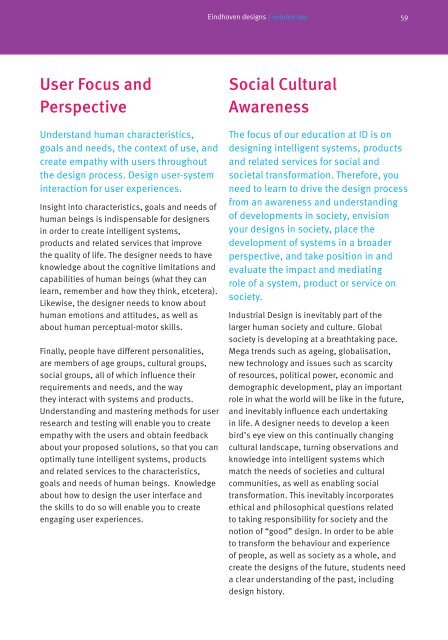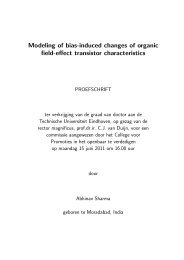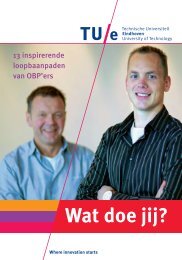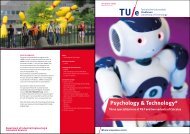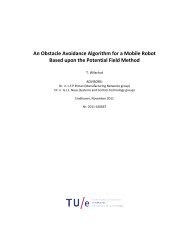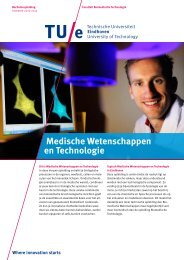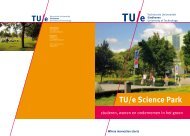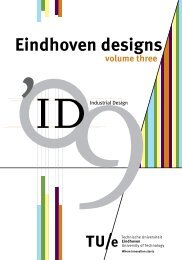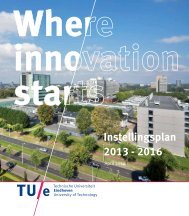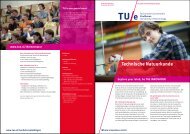Education guide 'Eindhoven designs' - Technische Universiteit ...
Education guide 'Eindhoven designs' - Technische Universiteit ...
Education guide 'Eindhoven designs' - Technische Universiteit ...
You also want an ePaper? Increase the reach of your titles
YUMPU automatically turns print PDFs into web optimized ePapers that Google loves.
Eindhoven designs / volume two<br />
59<br />
User Focus and<br />
Perspective<br />
Understand human characteristics,<br />
goals and needs, the context of use, and<br />
create empathy with users throughout<br />
the design process. Design user-system<br />
interaction for user experiences.<br />
Insight into characteristics, goals and needs of<br />
human beings is indispensable for designers<br />
in order to create intelligent systems,<br />
products and related services that improve<br />
the quality of life. The designer needs to have<br />
knowledge about the cognitive limitations and<br />
capabilities of human beings (what they can<br />
learn, remember and how they think, etcetera).<br />
Likewise, the designer needs to know about<br />
human emotions and attitudes, as well as<br />
about human perceptual-motor skills.<br />
Finally, people have different personalities,<br />
are members of age groups, cultural groups,<br />
social groups, all of which influence their<br />
requirements and needs, and the way<br />
they interact with systems and products.<br />
Understanding and mastering methods for user<br />
research and testing will enable you to create<br />
empathy with the users and obtain feedback<br />
about your proposed solutions, so that you can<br />
optimally tune intelligent systems, products<br />
and related services to the characteristics,<br />
goals and needs of human beings. Knowledge<br />
about how to design the user interface and<br />
the skills to do so will enable you to create<br />
engaging user experiences.<br />
Social Cultural<br />
Awareness<br />
The focus of our education at ID is on<br />
designing intelligent systems, products<br />
and related services for social and<br />
societal transformation. Therefore, you<br />
need to learn to drive the design process<br />
from an awareness and understanding<br />
of developments in society, envision<br />
your designs in society, place the<br />
development of systems in a broader<br />
perspective, and take position in and<br />
evaluate the impact and mediating<br />
role of a system, product or service on<br />
society.<br />
Industrial Design is inevitably part of the<br />
larger human society and culture. Global<br />
society is developing at a breathtaking pace.<br />
Mega trends such as ageing, globalisation,<br />
new technology and issues such as scarcity<br />
of resources, political power, economic and<br />
demographic development, play an important<br />
role in what the world will be like in the future,<br />
and inevitably influence each undertaking<br />
in life. A designer needs to develop a keen<br />
bird’s eye view on this continually changing<br />
cultural landscape, turning observations and<br />
knowledge into intelligent systems which<br />
match the needs of societies and cultural<br />
communities, as well as enabling social<br />
transformation. This inevitably incorporates<br />
ethical and philosophical questions related<br />
to taking responsibility for society and the<br />
notion of “good” design. In order to be able<br />
to transform the behaviour and experience<br />
of people, as well as society as a whole, and<br />
create the designs of the future, students need<br />
a clear understanding of the past, including<br />
design history.


